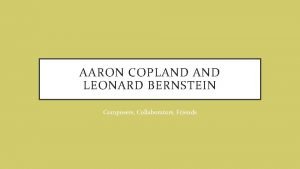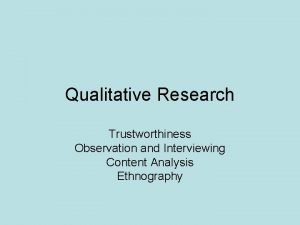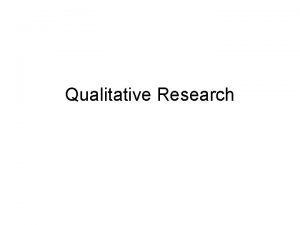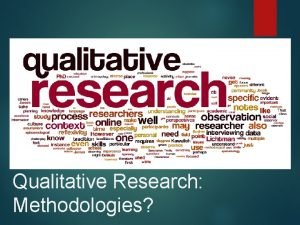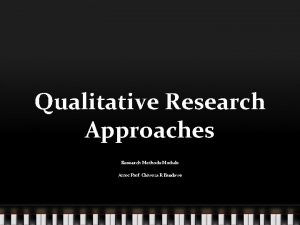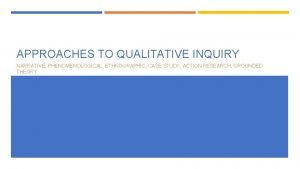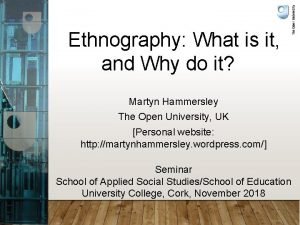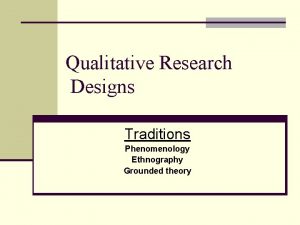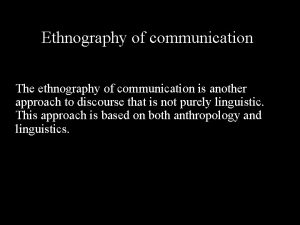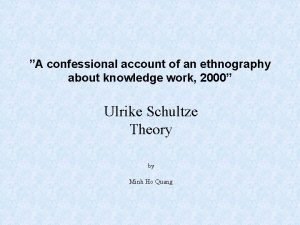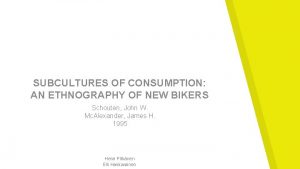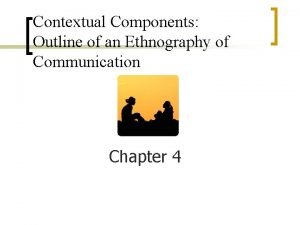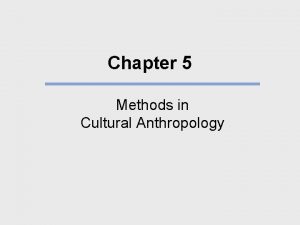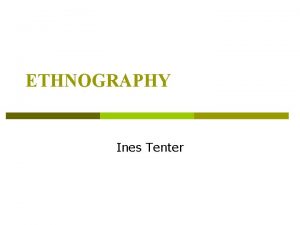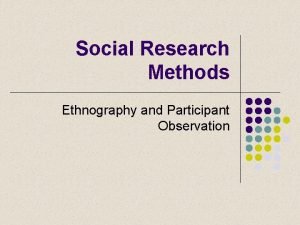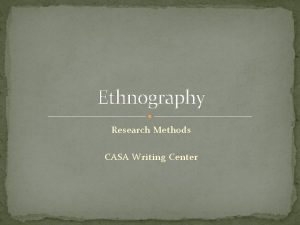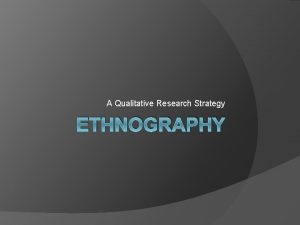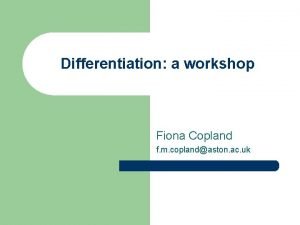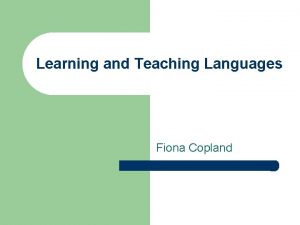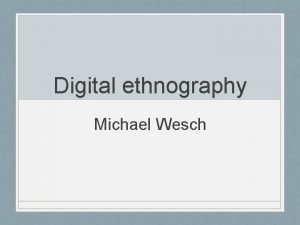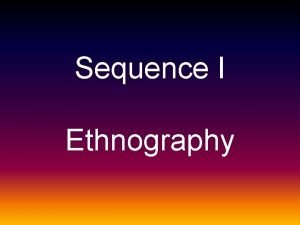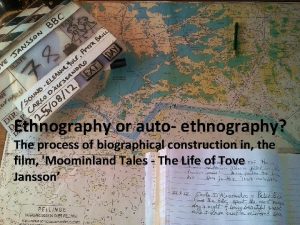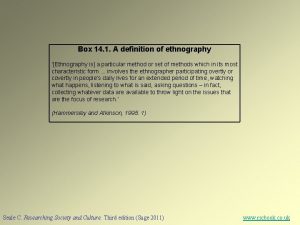Research Methods Linguistic Ethnography Fiona Copland f m















- Slides: 15

Research Methods Linguistic Ethnography Fiona Copland f. m. copland@aston. ac. uk

Task – thinking about research You want to investigate feedback in initial teacher training (that is, when tutors give teachers-in-training feedback on their teaching performance). You want to answer the following research questions: 1. How is feedback organised? 2. How are power relations between participants managed? 3. How is knowledge about language teaching discussed and described? What research methods would you use to investigate this area?

What is linguistic ethnography? 1. 2. 3. 4. It is an approach/philosophy rather than a method. It ‘marries’ (Wetherall, 2007) linguistics with ethnography: it ‘borrows’ data collection and analysis tools from ethnography and linguistics. It is ‘post-modern’ in that it is calls for the researcher to be reflexive. It is tied to the social in that it is used to research social problems/contexts. It is British in that it originates in UK sociolinguistics (cf. linguistic anthropology in USA).

What do linguistic ethnographers do? 1. They collect both ethnographic and linguistic data. Ethnography: Fieldnotes (through participant observation)/teacher diaries/ ‘go alongs’ (Rock, 2005)/interviews/’look backs’ Linguistics: Texts/audio recordings/visual recordings n

What do linguistic ethnographers do? They use ethnographic and linguistic tools of analysis: e. g. coding/categorising; CA (Conversation Analysis); multi-modal analysis; vignettes. Usually a focus on ‘micro-analysis’, analysing a small section of talk in a great deal of detail: the ‘aesthetic of smallness and slowness’ (Roberts, 2008).

What do linguistic ethnographers do? They ask: 1. 2. How do you know that? So what?

Why bring together ethnography and linguistics? The Linguistic Ethnography Forum characterises the relationship between linguistics and ethnography as ‘tying ethnography down’ and ‘opening linguistics up’ (2004: 4) so that the value of discourse analysis in ethnography is foregrounded (Creese, 2007) and overanalysis and interpretation is avoided (Roberts, 2008).

Why bring together ethnography and linguistics? ‘Ethnography can be seen as humanising language study, preventing linguistics from being reductive or shallow by embedding it in rich descriptions of how the users of a given variety adapt their language to different situational purposes and contexts. ’ (Rampton, 2007: 10).

Methodological warrant? The methodological warrant for LE is formalised by Heller and Martin-Jones (2001: 12) ‘The tools of ethnomethodological and interactionist sociolinguistics must be brought together with tools of ethnography, which allow us to situate interactions with respect to the webs and resources we have discussed. ’ n

What theories? Social Theory much invoked: e. g. Bourdieu, Giddens, Freire, Foucault. n Educational Theorists e. g. Bernstein, Mercer, Bloome n Discourse analytic frameworks: e. g. Fairclough, Hymes, Goffman, Gumperz n

What researchers? n n n n Ben Rampton Celia Roberts Angela Creese Janet Maybin Adrian Blackledge Karin Tusting Constant Leung Marilyn Martin-Jones

Return to the task Data: Participant observation (fieldnotes) Audio and video recordings Pre and post observation interviews. Analysis: Coding Speech Act Analysis ‘Integrated analysis’ (drawing on fieldnotes, interviews, video, linguistic analysis to create a commentary and a working interpretation) Micro-analysis of key sections of talk.

Using data sets in analysis n n 1. 2. 3. You have a section of a Ph. D thesis written as a linguistic ethnography. Answer the following: What data sets are used? What arguments are developed? How do the data sets together contribute to the development of the argument?

Reading Task Read through this section taken from Roberts C. and Sarangi S. (2001) ‘”Like you’re living two lives in one go”: negotiating different social conditions for classroom learning in a further education context in Britain’. In Heller M. and Martin-Jones M. Voices of Authority: Education and Linguistic Difference. Westport Connecticut: Ablex Answer the following questions: 1. What tools of data collection did they use? 2. What theories/theorists are mentioned? 3. What conclusions do the writers draw about Liz’s classroom and Frances’s classroom? 4. How do they arrive at these conclusions? 5. In what ways is this Linguistic Ethnograph?

Selected Bibliography n n n n n Bourdieu P. 1977. Outline of a Theory of Practice. Cambridge: Polity Press Creese A. 2003. Language, ethnicity and the mediation of allegations of racism: Negotiating diversity and sameness in multilingual school discourses. International Journal of Bilingual Education and Bilingualism. Vol 6 (3 -4), p. 221 -236. Creese A. 2007. ‘Linguistic Ethnography’. In Creese A, Martin P and Hornberger N (Eds) Encyclopedia of Language and Education, Volume 9. Springer. Fairclough N. 1992. Discourse and Social Change. Oxford: Polity Press Goffman E. 1967. On Face Work. In Interactional Ritual. New York: Basic Books. Goffman E. 1981. Forms of Talk. Philadelphia: University of Pennsylvania Press Goodwin C. 2000. Action and embodiment within situated human interaction. Journal of Pragmatics Vol. 32, 1489 – 1522 Hymes D. (1974) Foundations in Sociolinguistics: an Ethnographic Approach. Philadelphia: University of Philadelphia Press Martin-Jones M. and Saxena M. 1996. Turn-Taking, Power Asymmetries, and the Positioning of Bilingual Participants in Classroom Discourse. Linguistics and Education 8, p. 105 - 123 studies of talk and learning in education. Paper given at BAAL Linguistic Maybin J. 2003. The potential contribution of Linguistic Ethnography to Vygotskian Ethnography Forum, Leeds, 2003. Accessed from http: //www. ling-ethnog. org. uk/baalleeds 2003. htm, 18 th December, 2007 Mercer N. 1995. The Guided Construction of Knowledge. Clevedon: Multilingual Matters Rampton B. 2007 b. Neo-Hymesian Linguistic Ethnography in the UK. Journal of Sociolinguistics. Vol. 11 (5), 1 -19 Roberts C and Sarangi S 1999. Hybridity in gatekeeping discourse: Issues of practical relevance for the researcher. In Roberts C and Sarangi S. Talk, Work and Institutional Order Discourse in Medical, Mediation and Management Settings. Berlin: Mouton de Gruyter. Roberts C. and Sarangi S. 2001. ”Like your’re living two lives in one go”: negotiating different social conditions for classroom learning in a further education context in Britain. In Heller M. and Martin-Jones M. ( eds) Voices of Authority: Education and Linguistic Difference. Westport, CT: Ablex Tusting K. and Maybin J. 2007. ‘Linguistic ethnography and interdisciplinarity: Opening the discussion’. Journal of Sociolinguistics Vol 11 (5), 575 - 583 Wetherell M. 2007. A step too far: Discursive psychology, linguistic ethnography and questions of identity. Journal of Sociolinguistics. Vol. 11 (5), 662 -681
 Aaron copland friends
Aaron copland friends Advantage and disadvantage of ethnography
Advantage and disadvantage of ethnography Example of quantitative research
Example of quantitative research Sensory ethnography
Sensory ethnography Phenomenology vs ethnography
Phenomenology vs ethnography Weakness of qualitative research
Weakness of qualitative research Ethnographic research template
Ethnographic research template Phenomenology vs ethnography
Phenomenology vs ethnography What is ethnography
What is ethnography Phenomenology and ethnography
Phenomenology and ethnography Narrative ethnography
Narrative ethnography Instrumentalities in communication
Instrumentalities in communication Confessional ethnography
Confessional ethnography Subcultures of consumption
Subcultures of consumption Ethnography outline
Ethnography outline Ethnography participant observation
Ethnography participant observation
